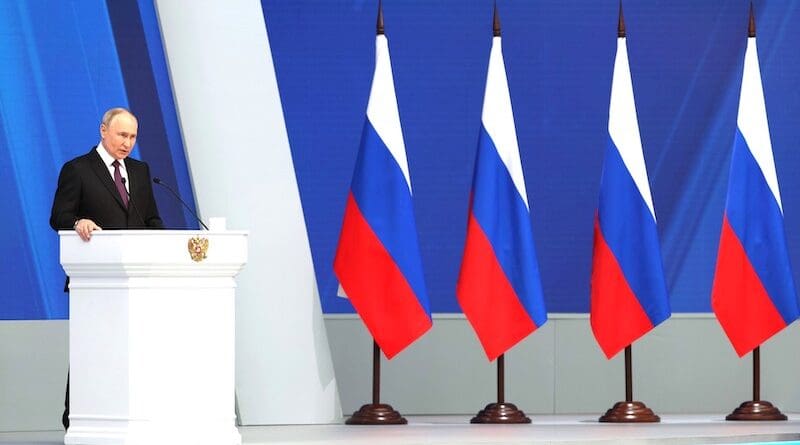What Happens After President Putin Leaves? – OpEd
By Ambassador Kazi Anwarul Masud
It has been proved again and again that attempts to replace President Vladimir Putin is fraught with danger. Before Sergei Prigozhin’s untimely death , the founder and former head of the Wagner Group and apparently close to President Putin used to frequently one has to be very careful to put his name forward to be a successor to Putin. Frida Ghitis a world affairs columnist and a regular contributor to CNN and The Washington Post in a recent article wrote about the risks that one would take in forwarding his or her name as a possible successor lest the person so named meets the fate of Sergei Prigozhin.
Vladimir Putin who cut his teeth in politics in St. Petersburg in the 1990s, after having spent decades working in the shadowy Soviet-era KGB. His spectacular rise to national power began in 1999 when then-President Boris Yeltsin unexpectedly named him prime minister. Yeltsin resigned months later, and the 46-year-old former spy became acting President. He promptly won the 2000 presidential election, his popularity propelled by the brutal military campaign he had already launched against Chechen separatists.
He has held the office ever since, with a brief interlude between 2008 and 2012 when he switched jobs with his then-prime minister, Dmitry Medvedev, to offer a pretense of respect for constitutional term limits. In case anyone doubted that Putin has no intention of surrendering power, he more recently orchestrated a constitutional change that allows presidents to run for two consecutive six-year terms, but reset the clock to zero starting at the end of his current term. After a quarter of a century in power, he can now serve another 12 years. Barring a palace coup or a revolution, there are half a dozen people within Putin’s circle who are considered possible successors. The first name that emerges in those discussions is Medvedev, the former president who now serves as the deputy chairman of the Security Council. Medvedev was once viewed as more moderate than Putin and potentially even a reformer. But since Russia’s all-out invasion of Ukraine in 2022, he has become a fire-breathing nationalist, hurling insults and threats at Ukraine and the West. Mostly, he seems desperate to demonstrate his loyalty to Putin. If the inner circle were looking for a successor, however, Medvedev would be doubly handicapped, tainted by both his former moderate image and his current nationalism. To the extent that there is a legal succession plan, Prime Minister Mikhail Mishustin would take over the top job if it became vacant, just as Putin did with Yeltsin. But Mishustin is not viewed as a particularly strong player in the inner circle, which may explain why Putin picked the former tax official for the job in 2020: He poses no threat.
One member of the inner circle who is viewed as powerful and ruthless is Nikolai Patrushev, the head of the Security Council. Patrushev is a force in the regime and could conceivably become Putin’s successor. Anyone expecting a more moderate regime under Patrushev would likely be disappointed. He is virulently anti-Western and a fount of anti-Ukraine invective. Like Putin, Patrushev was born in Soviet-era Leningrad—now St. Petersburg—and came up in the KGB’s successor agency, the Federal Security Service.
There’s no sign that Putin intends to set up a dynastic system. Barring a palace coup or a revolution, there are half a dozen people within Putin’s circle who are considered possible successors. Then there’s Alexei Dyumin. Despite his relatively low national profile, the governor of the Tula region has seen his stock rise in recent years. A former Putin bodyguard, Dyumin has become a top military official, having played a pivotal role in the successful capture of Crimea in 2014. That operation was conducted smoothly and efficiently, in contrast to the war in Ukraine since 2022, burning the image of those who participated. Dyumin’s name emerges frequently in discussions about a post-Putin succession. Speaking of invasions and wars, there is also Defense Minister Sergei Shoigu, who has served Putin in that capacity for more than a decade. Born in faraway Siberia, near the Mongolian border, Shoigu nevertheless managed to rise through the ranks and join Putin’s inner circle.
But his standing became tenuous as the war in Ukraine went disastrously wrong in its early stages. Before Sergei Prigozhin’s untimely death in August, the founder and former head of the Wagner Group used to frequently—and very publicly—lambast the army’s incompetence, eroding Shoigu’s reputation. Adding injury to those insults, Prigozhin’s short-lived mutiny against Putin in June 2023, during which Shoigu was curiously silent, also diminished his stock. If there’s one political figure who might enjoy popular support after Putin’s departure, it is Sergei Sobyanin, the dapper and well-respected mayor of Moscow. Sobyanin has held the job since 2010, overseeing the modernization of the city and earning high marks from many residents.
As one of the most popular—and still living—politicians in Russia, he has become the object of what may be the unwanted embrace of Putin’s United Russia party. That’s perhaps an effort by Putin to tarnish Sobyanin’s luster in the capital, where many of the more liberal Russians are not fans of the party. Still, he has close ties to the president. He served under Putin, working as Kremlin chief of staff until 2008 and then as deputy prime minister when Putin became prime minister after switching jobs with Medvedev. These are some of the insiders whose names come up in discussions of a relatively orderly transition to replace Putin. But it’s worth noting that, despite Putin’s iron grip on power, there are strong undercurrents of discontent, even as Putin’s critics continue to die in mysterious circumstances. There’s no sign that Putin intends to set up a dynastic system. His daughters—his only known heirs—have stayed out of politics. The future of power in Russia is impossible to predict.

